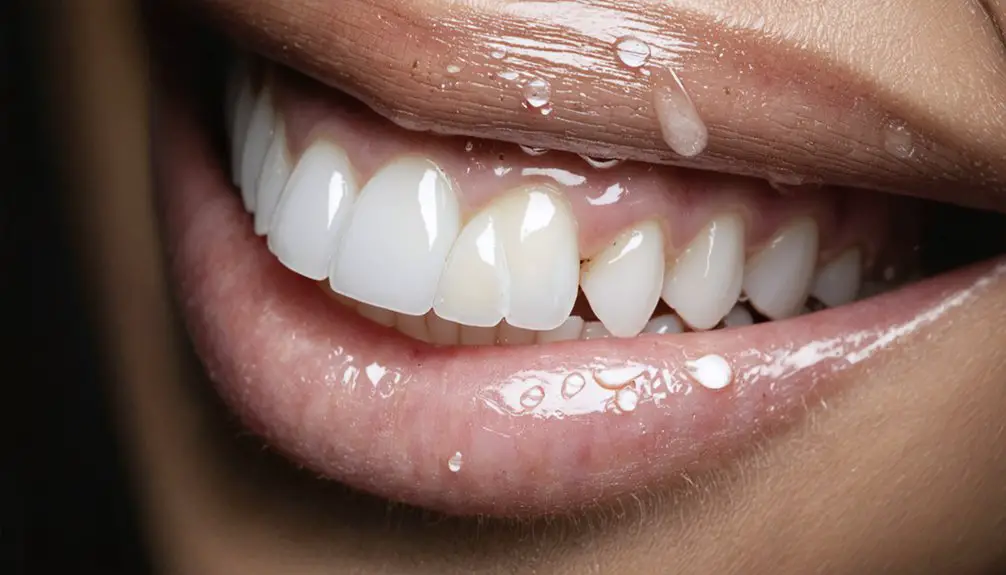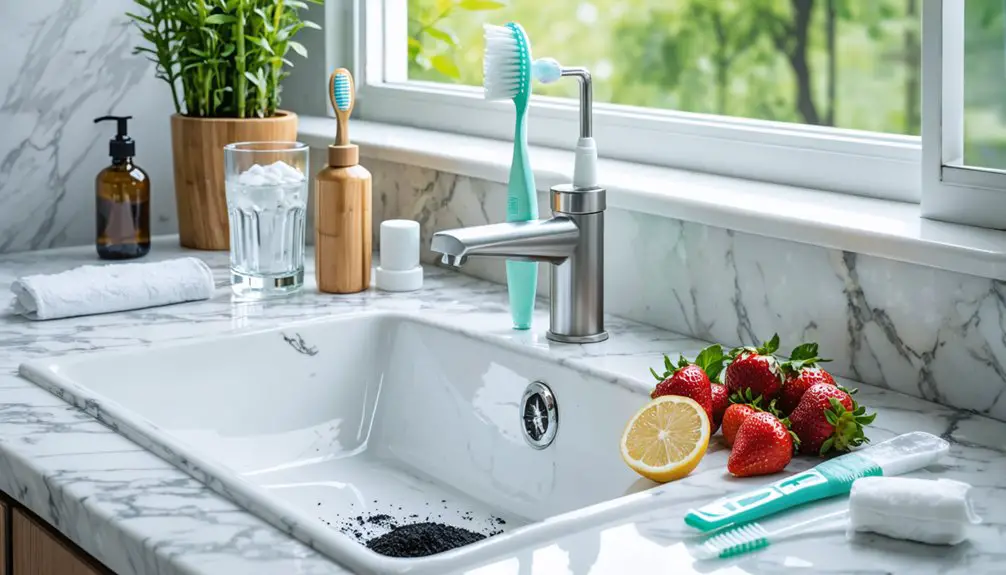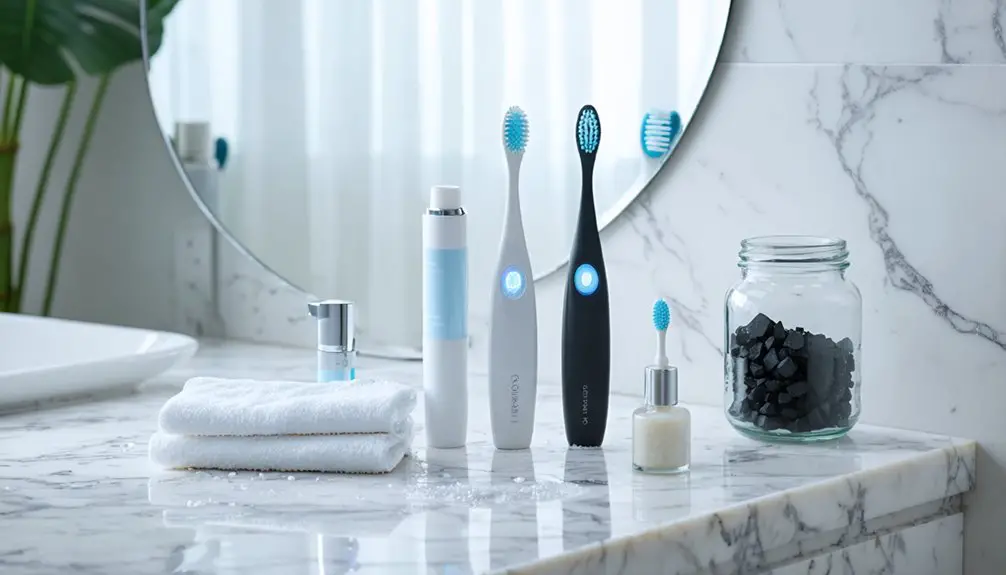To maintain your teeth whitening results longer, you’ll need to focus on daily oral hygiene and strategic dietary choices. Brush twice daily with whitening toothpaste, floss regularly, and rinse immediately after consuming staining beverages like coffee or red wine. Use a soft-bristled toothbrush, incorporate natural cleansers like crunchy apples, and schedule professional cleanings every six months. Understanding the complete maintenance timeline and proper care techniques will help you achieve lasting brightness.
Key Takeaways
- Brush twice daily with whitening toothpaste and soft bristles while alternating with fluoride toothpaste to protect enamel.
- Avoid staining beverages like coffee, red wine, and cola, or rinse immediately with water after consumption.
- Schedule professional dental cleanings every six months and follow dentist-recommended touch-up treatments with custom trays.
- Incorporate natural cleansers into your diet, such as crunchy apples and strawberries, along with tooth-strengthening dairy products.
- Floss daily and use interdental cleaning tools to remove plaque that can diminish whitening results.
Daily Habits That Preserve Your Bright Smile
While maintaining a bright smile requires consistent effort, establishing the right daily habits can greatly extend the longevity of your whitening results.
You’ll need to brush at least twice daily with fluoride toothpaste and floss once daily to remove plaque effectively. Using desensitizing toothpaste can help create a protective barrier if you experience sensitivity after whitening. Consider natural remedies like rinsing with water immediately after consuming staining beverages and foods.
Make essential lifestyle adjustments by using straws for pigmented drinks and limiting their consumption to single sittings rather than throughout the day.
Use a soft-bristled toothbrush to protect your enamel while incorporating whitening toothpaste with gentle abrasives.
When consuming potentially staining substances, rinse your mouth promptly or brush your teeth shortly after to minimize discoloration and preserve your bright smile.
Enjoy crunchy fruits and vegetables like apples and celery as they act as natural teeth cleaners while snacking.
Smart Dietary Choices for Lasting Whiteness
Beyond daily oral care habits, your dietary choices greatly impact the longevity of teeth whitening results. To protect your investment and maintain those pearly whites, focus on consuming light-colored foods while avoiding highly pigmented and acidic options. Your teeth are most vulnerable to staining when pores remain open after whitening treatments. Whole grains and yogurt provide essential nutrients that support long-term dental health.
Smart food choices after teeth whitening can make the difference between results that last and those that quickly fade away.
Consider smart colorful alternatives and strategic snack swaps to preserve your bright smile.
- Choose light-colored proteins and vegetables like chicken, cauliflower, and pears instead of tomato-based sauces and dark berries.
- Incorporate natural cleansers like crunchy apples and strawberries, which contain beneficial enzymes for stain removal.
- Opt for tooth-strengthening dairy products and water to help remineralize enamel and rinse away staining agents.
- Minimize exposure to staining beverages like coffee, red wine, and cola, especially during the first 48 hours post-whitening.
Professional Care and Touch-Up Strategies
To maintain professional whitening results long-term, you’ll need a strategic combination of dental supervision and carefully timed touch-up treatments.
Schedule regular dental cleanings every six months to remove surface stains and protect your enamel’s protective layer against new discoloration. Floss daily and thoroughly to prevent stains from developing between teeth.
Follow your dentist’s recommendations for at-home touch-ups using custom-fitted trays, typically every six months.
Don’t exceed two touch-up sessions per treatment cycle, wearing trays for one to two hours daily. If you experience sensitivity, use dentist-approved desensitizing toothpaste and consider pain relievers temporarily.
Professional touch-ups can last from six months to three years, depending on your lifestyle habits.
Avoid consuming coffee and red wine as these beverages can quickly stain your whitened teeth.
Your dentist will help determine the ideal frequency based on your oral health, staining patterns, and enamel sensitivity, ensuring safe and effective maintenance of your bright smile.
Essential Oral Hygiene Practices
Maintaining your whitened smile requires a thorough oral hygiene regimen that addresses multiple aspects of dental care. Brush for at least 2-3 minutes using whitening toothpaste with mild abrasives, alternating with regular fluoride toothpaste to protect your enamel. Proper flossing techniques and interdental cleaning are essential for removing stains between teeth where brushes can’t reach. Regular dental check-ups every six months ensure professional maintenance of your whitening results. Consider switching to gentle whitening agents in your toothpaste to avoid damaging sensitive teeth.
- Use a soft-bristled toothbrush and wait 30-60 minutes after consuming acidic foods before brushing to prevent enamel damage.
- Incorporate dental picks or interdental brushes if traditional flossing proves challenging.
- Rinse immediately with water after consuming staining beverages to minimize discoloration.
- Include crunchy fruits and vegetables in your diet to naturally help remove plaque while promoting saliva production.
Understanding Your Whitening Maintenance Timeline
While every smile responds differently to whitening treatments, understanding your personal maintenance timeline is essential for sustaining desired results. Your dentist will develop personalized maintenance schedules based on your dietary habits, lifestyle factors, and sensitivity levels.
For professional in-office treatments, expect touch-ups every 6 months, while at-home whitening strips typically require monthly maintenance. Daily whitening toothpaste helps preserve results between treatments. Professional grade ingredients deliver more effective and lasting results compared to over-the-counter options. Consulting with dental professionals first ensures you select the most appropriate and effective whitening method for your needs.
Your maintenance timeline should balance effectiveness with whitening sensitivity management. Most patients maintain their desired shade with professional retreatment every 6 to 12 months, though frequent exposure to staining substances like coffee or wine may necessitate more regular touch-ups.
If you experience sensitivity, your dentist might recommend alternating treatment days or adjusting frequency while still achieving your desired results.
Frequently Asked Questions
Can Whitening Treatments Damage Existing Dental Work Like Crowns or Veneers?
You won’t damage your crowns or veneers with whitening treatments due to their dental restoration compatibility. However, be aware that whitening only affects natural teeth, potentially creating color mismatches.
Is It Safe to Whiten Teeth While Pregnant or Nursing?
Better safe than sorry – you should wait until after pregnancy and nursing to whiten your teeth. While no definitive proof shows harm, dental experts recommend postponing whitening treatments to protect your baby’s health.
How Soon After a Root Canal Can I Undergo Teeth Whitening?
You’ll need to wait at least 3 weeks after your root canal for proper recovery before starting any whitening treatment. For ideal results and minimal sensitivity, some dentists recommend extending the whitening timeline to 2-3 months.
Does Charcoal Toothpaste Effectively Maintain Professional Whitening Results?
While charcoal toothpaste’s effectiveness in maintaining whitening results is limited, you’ll find it less reliable than other options and may risk dental safety through enamel erosion and increased tooth sensitivity.
Can Certain Medications Affect How Long Teeth Whitening Results Last?
You’ll need to watch out – certain medication types like tetracycline, antihistamines, and decongestants can greatly reduce your whitening duration through intrinsic staining and dry mouth effects.
References
- https://www.designerforsmiles.com/cosmetic-dentistry/how-frequently-should-i-whiten-my-teeth/
- https://www.tfdnola.com/blog/teeth-whitening-maintenance-establishing-a-schedule-for-long-term-results.html
- https://coliseumdentalwc.com/teeth-whitening-101-how-often-is-too-often/
- https://www.hotspringsdentist.org/how-long-do-teeth-whitening-results-last-tips-to-prolong-the-effect/
- https://www.wdsnaperville.com/how-long-does-teeth-whitening-last–tips-to-maintain-your-bright-smile
- https://www.jonesborodentalcare.com/blog/maintain-my-teeth-whitening/
- https://maplewooddental.com/how-to-maintain-your-results-after-professional-teeth-whitening/
- https://www.ahgcdental.com/blog/how-long-do-teeth-whitening-results-typically-last/
- https://www.drckidsdentistry.com/how-to-maintain-the-results-of-professional-teeth-whitening/
- https://www.dananigueldental.com/blog/how-to-maintain-your-teeth-whitening-results-in-dana-point



